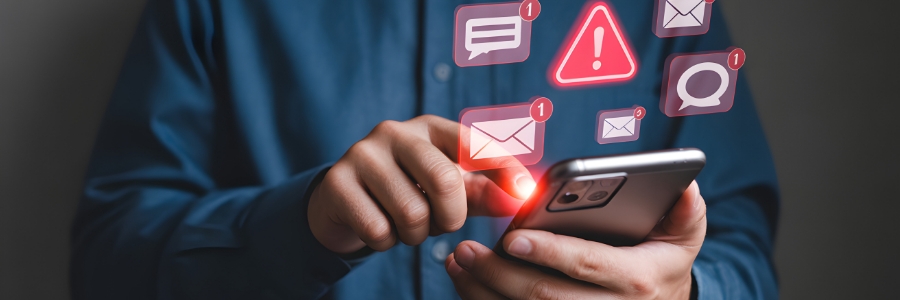Your office is more connected now than ever, so even if you don’t operate a remote or hybrid work environment, your employees need to access business networks and communications via smart phone. While it may be cheaper and convenient, using personal phones in this capacity comes with hidden dangers that can put sensitive company data at risk.
If you operate a small business, it’s tempting to overlook mobile security, assuming it’s less critical than desktop or server protection and an unnecessary expense. In reality, personal devices are one of the easiest entry points for cybercriminals, so let’s take a look at the risks of using personal phones for business purposes and what you can do about it.
What are the risks of employees using personal phones for business?
Unlike company-issued devices, personal phones are not standardized and you have little to no control over the other apps installed on them. This makes it harder to understand your risks and enforce consistent security policies.
If you allow personal mobile devices to access your cloud network, databases, or business communication channels, be aware of these risks:
- Data breaches through unsecured apps – Not every app on a personal phone can be guaranteed secure, and even fewer are rated for business cybersecurity. If employees access business emails or documents through an unprotected app, sensitive data may be exposed through the compromised app without the attacker ever needing network access.
- Weak or nonexistent security settings – Many users don’t update their phones regularly, leaving vulnerabilities that attackers can exploit. Others may skip features such as encryption or biometric locks if you don’t have a strong and enforced policy.
- Lost or stolen devices – A misplaced phone containing work data is a major liability, especially if it has weak security settings as mentioned above. Without remote wipe capability, one lost or stolen phone could give a criminal organization free access to your network.
- Compliance violations – If you’re in an industry governed by strict regulations such as HIPAA, PCI DSS, or GDPR, storing business data on unsecured personal devices can result in penalties and legal consequences regardless of the security settings.
- Mixing personal and professional use – Employees may store business files alongside personal photos and messages on the same app. This increases the likelihood of accidental sharing or unauthorized access. Communicating with clients or partners via personal accounts and phone numbers is both unprofessional and risky, and it tarnishes your image of a serious and secure business.
These risks show why unmanaged personal phones can quickly become a weak link in your organization’s security chain. Poorly secured mobile devices not only increase your risk of a serious cyberattack, but also can lead to compliance violations, lost customer trust, and insider attacks.
How to reduce cybersecurity risk for mobile devices
The good news is that you don’t need to ban personal device use altogether, and while more secure, you don’t need to invest in a fleet of specialized company phones. With the right policies and tools in place, personal mobile devices can be used safely and productively.
Here are strategies you can implement to reduce the risk of mobile device data breaches:
- Implement and enforce a bring your own device (BYOD) policy.
- Use mobile device management (MDM) solutions.
- Require strong multifactor authentication (MFA).
- Segment business and personal data.
- Educate employees on mobile security.
Secure your mobile business communications with VoIP
To keep business communications secure and professional, even when using personal devices, implement a secure VoIP solution. A modern VoIP system integrates all your communication channels on one secure app, so it is segmented from the rest of a potentially unsecure mobile device.
Your employees can also contact customers and business partners via company phone numbers and accounts on their personal devices, switching seamlessly back and forth. Best of all, these solutions can be centrally managed and monitored for better security and oversight.
Our cybersecurity professionals can not only provide mobile device management services but also help you implement and maintain a secure VoIP solution. Contact outsourceIT for a free consultation on how we can keep your network safe and productive.

